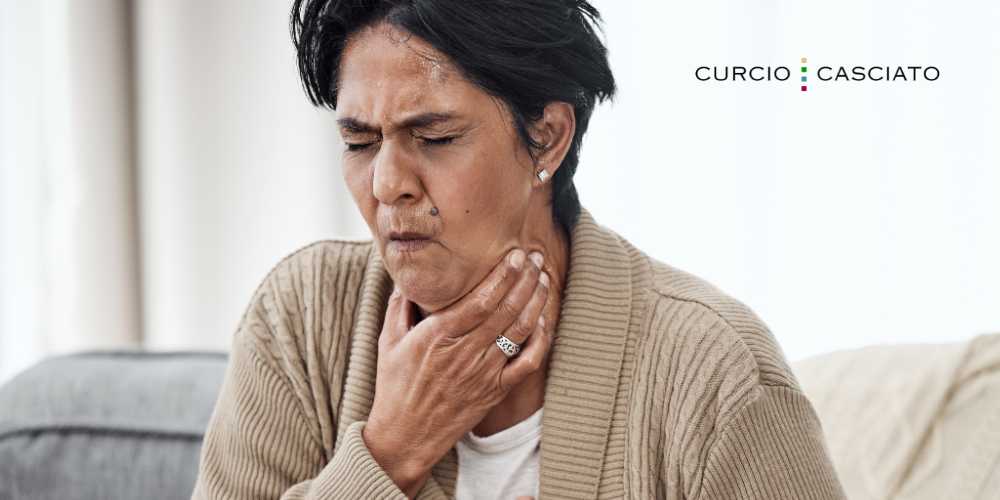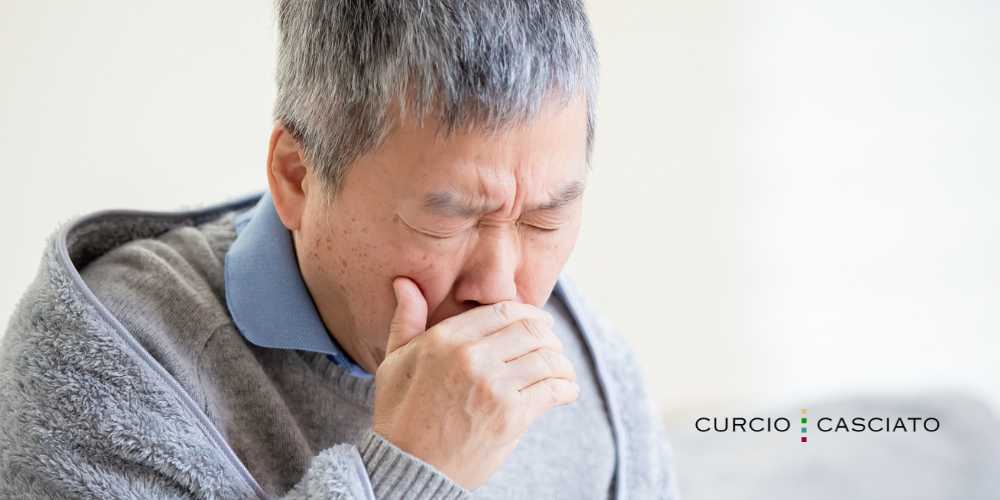Chicago Elderly Choking Lawyer
PRACTICE AREAS
The Chicago elderly choking lawyer team at Curcio & Casciato provides experienced legal assistance for elderly residents who suffer preventable choking accidents and choking deaths caused by abuse or neglect in long-term care facilities. Our nursing home choking lawyers in Chicago understand the serious consequences of choking hazards that threaten the lives of vulnerable residents, often due to a lack of proper care to prevent choking accidents. If an elderly person in your family has suffered a choking incident or choking death as a result of nursing home abuse, a skilled attorney at Curcio & Casciato can help you seek justice.
Our Chicago elderly choking attorney team provides a free consultation and takes nursing home choking cases on a contingency fee basis, so families only pay legal fees if our law firm secures a successful settlement or verdict.
If your family member was injured in an incident involving choking or suffered a choking death, call (312) 321-1111 to discuss a potential nursing home choking case.

When to Hire a Chicago Nursing Home Choking Lawyer
If a family member has suffered harm involving choking in a nursing home or care facility, it may be time to consult a nursing home abuse lawyer in Chicago, IL. Many nursing home choking cases and choking deaths result from lack of proper care, failure to prevent choking injuries for high-risk patients
Choking is the fourth leading cause of unintentional death cases, and nursing homes and assisted living facilities are trained to control and prevent choking emergencies.
If your loved one was an at-risk resident who suffered injury or choking death, our Chicago nursing home choking lawyers can help recover compensation and justice on their behalf.
Risk of Choking for Nursing Home Residents
Several factors can cause an increased risk of choking for assisted care facility or nursing home residents. High-risk older adults are those who:
- have difficulty swallowing food or trouble swallowing certain types of food (common medical conditions include dysphagia or Sjögren’s syndrome)
- have cognitive impairment conditions, like Parkingson’s or Alzheimer’s disease, that cause the throat muscles to not swallow food properly
- have dental problems or missing teeth
- have chronic heartburn or gastroesophageal reflux disease (GERD)
- are dehydrated
- have trouble sitting upright
- take certain medications that relax throat muscles or reduce awareness
Nursing home staff members are paid and trained to limit choking hazards for vulnerable residents and provide medical care before the nursing home resident suffers injury or choking death. When nursing homes fail to prevent injuries or choking-related deaths, our Chicago nursing home choking lawyer group can help families pursue financial compensation in nursing home choking cases or wrongful death lawsuits.
Consequences of Choking Incidents in Chicago Nursing Homes
A nursing home choking accident can result in critical injuries or, worse, choking death. According to the National Safety Council, choking is the fourth leading cause of unintentional death. This rate rapidly increases after age 71.
Permanent Brain Damage
When elderly residents choke in nursing homes or assisted care facilities, the lack of oxygen can lead to permanent brain damage and severe cognitive impairment. This often results in ongoing medical expenses and a need for specialized care. If a nursing home resident is at an increased risk of choking, any failures in supervision constitute nursing home abuse or negligence.
Our Chicago personal injury attorneys have extensive experience with nursing home choking cases involving injuries and nursing home choking deaths. We can help establish negligence to assist in seeking justice and compensation for medical expenses and other costs related to the case.
Pneumonia in Elderly Residents
Pneumonia for Chicago elderly residents is a serious risk following a choking injury in nursing facilities. Older adults have an increased risk of developing complications, especially in cases where they aren’t sitting upright or have clogged feeding tubes. In severe nursing home choking cases, choking-related pneumonia can result in a choking death. Our Chicago nursing home infection lawyers can review medical records to determine if nursing home abuse or neglect contributed.

Common Causes of Choking in Chicago Nursing Homes
A lot of factors can lead to choking accidents in nursing homes and assisted living facilities, including nursing home abuse and neglect. Below are some of the most common causes of choking incidents in Chicago nursing facilities.
Inadequate Supervision During Meals
Nursing homes must provide adequate supervision for nursing home residents who have trouble swallowing or other health issues. Failure to perform job-related tasks in these facilities causes minor choking incidents to escalate into choking emergencies, resulting in severe injuries or choking death.
Our Chicago elderly abuse attorneys are adept in proving negligence in these types of nursing home abuse and choking death lawsuits.
Failure to Address Swallowing Issues to Prevent Choking Incidents
Many nursing home residents have medical conditions, such as Alzheimer’s disease, that put them at an increased risk of a choking incident. Many seniors also “self-medicate” with candy to stimulate saliva production and reduce dry mouth, which poses an additional choking risk. Nursing homes and care facilities must provide assistance for elderly residents who have difficulty swallowing.
If a nursing home fails to accommodate a nursing home resident and that resident suffers, the facility can be held liable in a nursing home abuse or wrongful death lawsuit.
Improper Food Preparation
A nursing home resident with dental problems or other health issues should have a proper diet with correct food preparation for their needs. When elder care facilities fail to provide properly prepared food or fail to clean clogged feeding tubes, and a nursing home resident suffers harm or choking death, our Chicago nursing home malnutrition lawyers can help you pursue a nursing home abuse claim.
Nursing Home Understaffing
Corporate greed causes major understaffing issues in Chicago nursing homes. When there isn’t enough staff to properly monitor residents, this often leads to choking injuries and choking deaths in nursing homes. There should be enough staff to properly monitor all residents to reduce the risk of choking and prevent choking death situations. When there isn’t, the facility can be liable for nursing home abuse.
If nursing home understaffing in Chicago caused your loved one’s choking injury or death, contact our Chicago choking lawyer group for a free consultation.
Overmedicating Nursing Home Residents
Certain medications cause dry mouth, which leads to difficulty swallowing and increases the risk of choking. When nursing homes fail to monitor any at-risk resident who is taking these medications, they can be held accountable for the consequences of medication errors they cause.
Additionally, overmedicating nursing home residents can exacerbate the risk of choking, particularly when medications cause drowsiness.
Overmedication can even be used as a form of unreasonable restraint in Chicago nursing homes, forcing the resident’s sedation and increasing the risk of fatal choking incidents.
If medication errors or overmedications caused your loved one’s nursing home choking accident, call our Chicago nursing home medication error lawyer group for a free case evaluation.

How our Chicago Nursing Facility Choking Attorneys Can Help
When a nursing home fails to provide an elderly person at risk of choking with proper care, they should be held accountable for the choking incident for the sake of other residents. Our Chicago choking attorney group helps families of nursing home choking incident victims fight for justice and recovery.
Our law firm will evaluate the nursing home choking case and help seek compensation for future medical care and other damages related to the lawsuit.
Proving Negligence Led to the Nursing Home Choking Incident
Our Chicago nursing home choking lawyer group is adept at proving negligence contributed to the nursing home choking accident. Our legal team gathers critical evidence, such as medical records, staff training documentation, surveillance to determine if the resident had adequate supervision, reports of dietary modifications, and any reports on the facility’s history of similar incidents to help prove abuse or neglect caused your loved one’s choking incident.
Securing a Fair Nursing Home Neglect Settlement
Once our Chicago elderly choking lawyers establish negligence, we work diligently to secure a fair settlement that addresses the impact of the choking incident. If we can’t reach a fair choking settlement, we’ll provide experienced legal representation in a nursing home choking lawsuit in court.

How a Chicago Nursing Home Wrongful Death Lawyer Can Help
When a choking event results in wrongful death, our Chicago nursing home wrongful death attorneys assist in seeking justice and compensation through a wrongful death lawsuit.
We understand the profound grief and loss families experience as a result of nursing home choking deaths and are here to help hold the at-fault parties accountable for choking-related deaths.
Chicago Elderly Choking Attorney
If your loved one suffered because of a choking incident in skilled facilities or nursing homes, a skilled attorney can help you understand your legal rights to recover compensation. Our Chicago elderly choking lawyers can help your family seek justice for choking injury or choking-related death.
Our lawyers work diligently to hold negligent nursing homes accountable and protect our local senior citizens’ rights and dignity. Call (312) 321-1111 to schedule a free consultation with an experienced Chicago choking lawyer at Curcio & Casciato.


